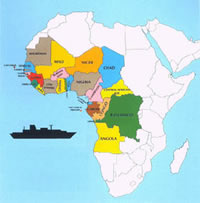
The Maritime Organisation for the West and Central Africa (MOWCA) was established in May 1975 (Charter of Abidjan) as the Ministerial Conference of West and Central African States on Maritime Transport (MINCONMAR). The name was changed to MOWCA as part of reforms adopted by the General Assembly of Ministers of Transport, at an extraordinary session of the Organisation held in Abidjan the Republic of Côte d'Ivoire from 4-6 August 1999.
The main objective of MOWCA is to serve the regional and international community for handling all maritime matters that are regional in character.
MOWCA unifies 25 countries on the West and Central African shipping range (inclusive of five landlocked countries). These countries comprise of 20 coastal states bordering the North and South Atlantic Ocean, and to explain the maritime link for landlocked countries the ports of the Ocean interfacing countries provide the seaborne trade of those that are landlocked.
What is of special interest for MOWCA is that together the countries within the remit of the organisation in 1998 generated an estimated 247million tonnes of cargo which represented 4.8% of world cargo, 95% of which was seaborne. MOWCA has also identified a number of problems at the sub regional level relating to the cost-effectiveness of shipping services these are; availability of shipping space, frequency of sailings, level of freight rates, competitiveness and survival of national/regional operators, efficiency of seaports, safety of cargo/ships, inland transportation networks, availability of coastal shipping services, efficiency of multi-modal transport systems and trade facilitation, protection of shippers interests, and the special case of landlocked countries.
The focus of MOWCA policy is on the following:
The overarching decision-making body for MOWCA is a General Assembly of Ministers of Transport of Member States meeting at ordinary sessions every two years and at extraordinary sessions if necessary.
The MOWCA Secretary-General (Mr. Magnus Teye ADDICO of the Republic of Ghana) coordinates the following three specialized Units for MOWCA these represent the ports, shippers and operators.
Countries affiliated with MOWCA are (in alphabetical order): |
||
Coastal States: |
||
Angola |
The Gambia |
Nigeria |
Benin |
Ghana |
Sao Tome and Principe |
Cameroon |
Guinea |
Senegal |
Cape Verde |
Guinea-Bissau |
Sierra Leone |
Republic of Congo |
Equatorial Guinea |
Togo |
Democratic Republic of Congo |
Liberia |
|
Cote d'Ivoire |
Mauritania |
|
Gabon |
Mozambique |
|
Landlocked Countries: |
||
Burkina Faso |
Chad |
Niger |
Central African Republic |
Mali |
|
Source: MOWCA 2008 |
||

The importance of MOWCA for the sustainable development of the NWAMSA partnership outline plan is evident. The expertise demonstrated by way of their policy underscores the significant benefits of developing a relationship between the organisations. MOWCA has also acknowledged the fact that African sub-region's coastal waters provide for some of the World’s busiest shipping routes; which in turn create for large volumes of tanker traffic inclusive of movements from African oil producing countries and maritime safety concerns are linked to maritime transport movements. More importantly MOWCA is already working towards problem solving with regards to issues associated with the implementation of various international conventions relating to safety (SOLAS), marine pollution (MARPOL) as well as the contemporary International Safety Management Code (ISM) and the Standard of Training Certification and Watch-keeping for Seafarers (STCW) Convention. It is extremely likely that NWAMSA will harness data and complement these MOWCA activitiesA point which reinforces the importance of MOWCA involvement in the partnership plan is the potentialities of overlap and clearly the intentions of NWAMSA are to build on existing structures and provide enabling mechanisms that will enhance current initiatives and not duplicate.
The following MOWCA (2008) statement `The over-riding role of MOWCA is to ensure for the sub-region a cost-effective shipping service high on safety and low on pollution´ emphasises the importance of the organisation to the development of a NWAMSA partnership plan.
A point of interest for the development of a NWAMSA action strategy is the comment made by MOWCA in relation to regional integration, this was `in the absence of a regional integration scheme, each country would develop its own regulatory framework, thereby erecting barriers and obstacles to trade and that the European experience is a worthy point of reference´. Clearly MOWCA recognises that fragmentation of the maritime regularity systems creates for management obstacles and therefore because maritime safety is an element of that system it can be assumed that this issue must also be included in that comment. Therefore it is envisaged that in the long term, NWAMSA will cultivate principles that have goodness of fit with MOWCA values, and as a priority therefore will aim to develop methodologies that will assist in the reduction of institutional barriers.